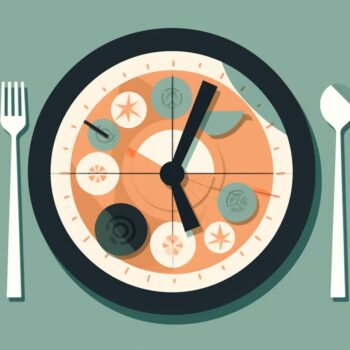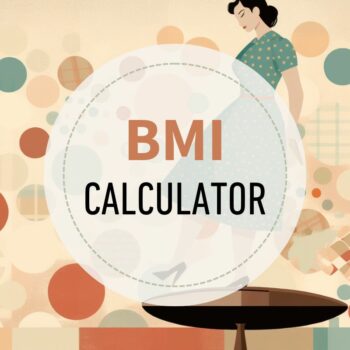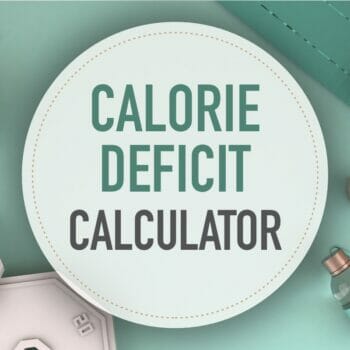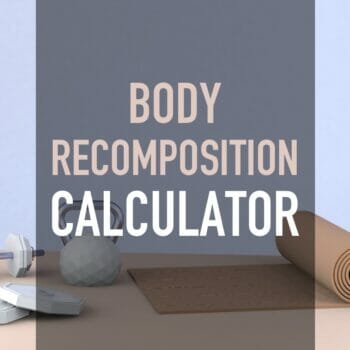TDEE Calculator
Use this TDEE calculator to quickly find your Total Daily Energy Expenditure (daily calorie needs).
Why is TDEE important?
Your TDEE (Total Daily Energy Expenditure) tells you exactly how much you must eat daily to maintain weight.
- Eat more than this, and you will gain weight.
- Eat less, and you will lose weight
This is called a calorie deficit – calculate it here.
Is TDEE and BMR the same?
No, they are not.
Every day your body burns a specific number of calories just by existing. This is known as your Basal Metabolic Rate or BMR.
BMR is based on weight, height, and age but does not include daily activity or exercise.
TDEE is effectively your BMR + extra exercise or activity.
TDEE and BMR are not the same, and as most people do more than lie in bed each day, TDEE is a more helpful tool.
Should I eat my TDEE to lose weight?
No. Your TDEE shows you your daily maintenance calories. If you eat your TDEE, you will stay the same weight.
How do you calculate TDEE for weight loss?
You lose weight by having a calorie deficit.
A calorie deficit means eating less than your body needs to maintain itself.
Ever had more bills than you had money? You had a financial deficit.
A calorie deficit is consuming less energy than you need to stay the same weight.
TDEE Weight Loss Example
Let’s say your BMR is 1,700 calories per day. With some physical activity, you end up with a TDEE of 2,300 calories.
To lose weight, you should consume around 1,840 calories per day.
How much should I subtract from TDEE?
After working with hundreds of successful clients, we’ve found a deficit of 20% from your TDEE is optimum.
You can also achieve a deficit by burning more calories through exercise.
Every effective diet, whether high fat, low fat, high carb, or low carb, uses a calorie deficit to achieve weight loss.
Why shouldn’t I subtract more calories?
Technically you could eat nothing all day and achieve weight loss through having a calorie deficit.
Many well-publicized crash diets put you into a severe caloric deficit. They result in short-term weight loss but will damage your metabolism.
Reducing your calories by more than 20% may lead to muscle loss. This is not desirable as muscle helps burn additional calories.
How long does it take to see results from a deficit?
There are 3,500 calories in a pound of fat, so with a 20% calorie deficit, most people will lose about a pound a week.
Your body can become conditioned to repeated exercise affecting your calorie intake and TDEE.
Not sure of the best path to achieving your health and fitness goals?
So switch things up from time to time! Change exercise routines, intensity, and duration.

How to get results with TDEE and a calorie deficit
Macro counting is a great way to hit your daily calorie target. You lose weight healthily and sustainably.
Counting macros (and flexible dieting) is non-restrictive. It means you still eat your favorite foods – provided they fit within your TDEE and macro goals.
You could eat unhealthy foods and still achieve weight loss. – as demonstrated by the 27-pound weight loss of Dr. Mark Haub.
However, loading your diet with fresh veggies, fruits, nuts, seeds, and lean meats is best. This way, you can feel awesome AND achieve weight loss.
TDEE FAQs
Does it matter what I eat if I count calories?
Yes and no.
You could eat nothing but snack cakes or pizza and still lose weight – if you maintain a calorie deficit.
However, for healthy body composition, a balanced diet is recommended.
Tracking macros will ensure you get enough of each macronutrient and meet micronutrient needs.
Does TDEE include exercise?
Yes, the TDEE is your total daily energy expenditure, so it must include all your movement in 24 hours.
Even non-exercisers are still doing activities around the house – eating, showering, running errands, etc.
Don’t confuse TDEE with Resting Energy Expenditure (REE) or Basal Metabolic Rate (BMR). These two represent energy expenditure if you lay in bed all day and did nothing.
How do I measure my TDEE and calorie intake?
Use the calculator above. It uses the most common variables.
If you want a genuinely accurate TDEE – talk to a coach.
Totaling your calories for the day is usually done with a macro tracking app.
How often should I recalculate my TDEE?
It would be best if you recalculated your TDEE as you lost weight. Do this every 6-8 weeks.
Does this have anything to do with BMI?
Body Mass Index or BMI is a measure of height and weight. It’s not the same thing as TDEE.
How do I use TDEE to gain muscle?
Once you’ve calculated your TDEE in the calculator above, add 10% to the calorie amount. The new calorie amount gives you a good starting point for weight gain.
If you still aren’t gaining, move this to a 20% surplus (use the macro calculator).
View article sourcesSources
- Rising, R., Harper, I. T., Fontvielle, A. M., Ferraro, R. T., Spraul, M., & Ravussin, E. (1994). Determinants of total daily energy expenditure: variability in physical activity. The American journal of clinical nutrition, 59(4), 800-804. study link
- Schulz, L. O., & Schoeller, D. A. (1994). A compilation of total daily energy expenditures and body weights in healthy adults. The American journal of clinical nutrition, 60(5), 676-681. study link
470 Comments


 Menopause Macro Calculator
Menopause Macro Calculator Intermittent Fasting Calculator
Intermittent Fasting Calculator BMI Calculator
BMI Calculator Calorie Deficit Calculator
Calorie Deficit Calculator Body Recomposition Calculator
Body Recomposition Calculator
Hi there. I’m 21 years old, female, 75kg and 167cm tall. My TDE says my maintenance is 2101 and if I am in a deficit I should be eating 1708 calories per day. Normally on a day to day basis I eat 1300-1400 and never feel starving but I am gaining weight whist lifting weights and doing cardio 2x per week. Why is this? If I were to start eating 1708 would I gain weight drastically? Confused here.
Hi Phoebe, It looks like the 1708 level would only be appropriate on days that you exercise. the other 5 days a week you should be eating at your sedentary weight loss levels.
Hi there! I am 18 years old old, 170cm and weigh 66.5 kgs. I had a personal trainer and she put me in a 1260 caloric deficit. Now that I am working on my own and want to continue losing weight, I am afraid that that is too low. Everywhere I work out my maintenance it is 2280 calories meaning my deficit should be roughly 1780 calories? Please help!
Hi Jade, You are correct, 1260 is too low for you. You have to fuel that exercise if you want to keep your metabolism in good shape and your muscle tissue well nourished. Without doing all the calculations myself it seems like the 1780 level is more appropriate.
Hi there I’m confused how many calories I should have, I’m 5ft 4 88kg and I’m active with horses 7 days a week on an evening, I’m averaging between 8000-12,000 steps a day, what calorie intake do you suggest, the TDEE calculator has said 1866 would you say that’s right? I’ve been doing this for 7 weeks and I am seeing a difference but not allot..HELP!
Hi Jade, A good way to approach any estimation is to try it out and then make adjustments if it’s not producing the results. You should be aiming for around 1 pound a week. So if you’re not hitting that mark, reduce your calories by 100 daily and see if that does the trick. Evaluate every two weeks.
Hi, I am so confused with what my calorie intake should be. So many conflicting articles. I’m 5ft and weigh 64kg and I want to lose weight. I have been averaging 1450 cals a day but have bouts of over indulging as I feel I can’t enjoy a little bit of luxury. I exercise with weights or HIIT train for 45 mins per day 6 days a week and average 11k steps per day. Should I be eating more???
Hi Kristen, It does seem like you’re undereating. Factor in your calorie burn and then deduct 20% for safe fat loss. If you eat more in general you’ll probably be less likely to be so hungry that you’re overdoing it.
Hi, i have a question regarding how many calories i should be eating. I am a five foot 3 19-year old female- i weight train most days, for 45 minutes and mix some cardio in on rest days. I currently weigh 50kg- i don’t want to lose any more weight but would rather just focus on becoming more lean. Thanks for your help!
Hi Eleanor, Have a read of this article of mine: Macros for Gaining Muscle and Cutting Fat
A bit confused about what my calorie intake should be for a calorie deficit? Im 29, 5 ft 5 and 220 lbs. i suffer with pcos also. I have an office job but walk 10-15,000 steps a day and do 2 evening work outs a week. What should my calorie intake be? I am trying my hardest to lose weight for July
Hi Chelsie, Your calculations are a tad more complicated because you have more than 40 pounds of fat tissue which will cause calculators to estimate higher than they should. I’d want to look at all your stats and factors to zero in on your optimal levels. Would you consider me doing that for you? https://healthyeater.com/personal-coaching
Hi, loved the article. I’ve been recovering from anorexia these past few months. I’m 17, 5ft9, (176cm) and weigh 120 lbs (54.5kg). The TDEE calculator suggested i should eat a little over 2000 calories. Since i’m still recovering, I’ve been slowly increasing my intake to help my metabolism slowly adjust. Do you think this is the best approach? Should I directly go to eating 2000 kcal daily, or gradually increase my intake until i achieve that goal?
Hi Amelie, I think a gradual approach is best and is probably more kind to your body as your metabolism is catching up. So glad you’re on a path towards better health and best wishes for your recovery.
Hello,
I am 20, female, 5’11 and weigh 318lbs, my TDEE is 3178 calories so according to the information above for my deficit I should be consuming about 2600 calories daily. However other calculators have suggested I intake between 1900-2100 calories a day? Just wondering if I should stick to the calorie deficit other calculators have suggested or up my intake to around 2500 calories a day?
Hi Jay, So glad you’re on a journey towards better health. Unfortunately, fat tissue can skew the calculations so those with a higher percentage than average need to consider lean mass in their calculations. The formulas used by various calculators are based on averages. On a rest day, you’d probably be below 1900 to be in your optimal fat-burning zone.
Hi Ted, I am 29woman 5ft 7inches now at 10stone 5 , I started off at 11stone 2 at the start of lockdown 2 in October with no exercise. My macros are 40% protien 40% carbs and 20% fat and I’m eating 1350cals a day. I want to get to 10 stone but these last 5 pounds will not budge! I have now started running 3 times a week and strength/weight training & 30-40mins HITT workouts (using weights) ever since starting my running, I have zero energy, metabolism has slowed right down and no motivation, my sleep is not as good as before I started exercising and I can’t seem to budge these last 5 pounds. I used your calculator and it comes out of 2301 TDE. Should I be eating 1600 cals a day to get myself out of this platue, from reading your articles I think my body is in a starvation mode?thanks
Hi Hannah, You nailed it. You’re eating too little to support a healthy metabolism and the exercise you are doing. Your protein is a tad too high also. Eat more and if you need help fine-tuning things, check out my coaching services.
I am so confused! I am 25, 138lb female. I have eaten on a calorie deficite for a while now but have not noticed weight loss. I work a very sedentary job but work out 2/3 times a week burning 400-600 calories. I’m eating around 1360 calories a day and see no change.0
Hi Carolyn, It seems like you’re undereating on days that you burn 400-600 calories. You need to eat to support that exercise. If you don’t your body will do some strange things to preserve itself. Not sure about your rest days as I don’t know how tall you are.
I’m so confused I don’t know if I’m coming or going. I use a Garmin fitness watch to measure activity. I’m using MyFitnessPal to track calories.
Garmin shows for example that I’ve been Active for 1537 cal, and consumed 1031, but then it shows remaining calories 1706. I’m on a 1200 cal a day eating plan. So what do I actually eat? Do I eat 1031 and stick to that, or should I eat the additional 1706, that pushes up my calories to 2737? It seems like a lot of food. I’m 80kg, and 1.74 tall and do between 30 and 60min of running or strength exercise 5 times a week.
I’ve seen people on SleekGeek eating 800cals a day, and the community praising that. Which seems very little.
Hi Renchia, You definitely need to support your exercise with enough nutrition and at 1031, you aren’t doing that. This will eventually cause you to lose muscle and slow your metabolism. However, trackers tend to overestimate burn. Only track your purposeful exercise and add that back in.
I’m 57, 5’3″, 145lbs lightly active. I learned here my TDEE is 1645, so I’ll aim for 1145 calories to lose. (Yikes!) What is your opinion on Intermittent Fasting 16:8…. I find it relatively easy to manage my food intake within that format, unless it damages my metabolism and works against me and my progress. What are your thoughts?
Hi Jane, First, in your case, you wouldn’t want to use the “deduct 500 rule” Please you my macro calculator to establish a safe deficit that’s appropriate for your stats. Flexible Dieting Macro Calculator Secondly, IF is good as long as it isn’t too extreme. Your body was designed to have a fasting period each day. 14 hours is more than adequate but don’t go any longer than 16. All the best!